The University of Macau (UM) places great importance on educating students and staff about the Constitution of the People’s Republic of China and the Basic Law of the Macao Special Administrative Region (SAR). The aim is to deepen their understanding of these key legal frameworks and cultivate responsible citizens committed to societal progress.
Establishing the Centre for Constitutional Law and Basic Law Studies
The ‘one country, two systems’ principle has been implemented in Macao for 25 years. In early 2018, UM’s Faculty of Law (FLL) established the Centre for Constitutional Law and Basic Law Studies to strengthen teaching and research in this area. Prof Jiang Chaoyang, director of the centre and an expert in constitutional and administrative law, explains, ‘Our long-term goal is to establish the centre as a hub for high-impact research, academic exchange, talent development, and advisory services. At the same time, we aim to foster a strong sense of patriotism and pride in Macao. This vision drives both our teaching and research.’
Prof Jiang stresses that both the Constitution and the Basic Law form the constitutional foundation of the Macao SAR, and that the Constitution should also be taken into account when promoting the Basic Law. He explains, ‘The Constitution is the fundamental law of the state and is the source of authority for the Basic Law, which is enacted under the Constitution. Although mainland China and Macao have different social systems, the Chinese Constitution as a whole remains valid in the Macao SAR. It is important for everyone who lives, studies, or works in Macao to recognise this fact.’
General education course for undergraduates
‘When we first set up the centre, our main priority was to ensure that every UM student received a proper education on the Constitution and the Basic Law,’ Prof Jiang adds. These topics are now included in ‘Law and Society’, a compulsory general education course designed to enhance undergraduate students’ understanding of both the national and Macao legal systems, and foster a stronger sense of belonging.
Lai Kuan Ju, research assistant professor in FLL, has been an instructor for this course since 2019. He says, ‘We expect our students not only to uphold the Constitution and the Basic Law and avoid actions that might harm the country’s interests, but also to actively protect those interests and contribute to the country.’ Speaking about his teaching approach, Prof Lai explains that he does not analyse every article in the laws during class or require students to memorise them. ‘Instead, I follow the UM Structured Teaching Plan for the Constitution and Basic Law Education, where I explain the background of how the two laws were created, and how the articles relate to each other. To keep students engaged, I incorporate storytelling and the historical context of the post-World War II era while discussing how China established its current socialist system.’
The general education course was updated in 2022 to include national security topics, which cover the evolution of the Chinese government’s approach to national security and the key concepts of the holistic approach to national security.
According to Prof Lai, the university allows students to take the course in either Chinese or English, ensuring that students from Macao, mainland China and elsewhere gain a comprehensive understanding of the significance of the Constitution and the Basic Law in the Macao SAR. To help international students understand China’s political system, Prof Lai compares it with those of other countries. ‘By the end of the course, whether they took it in Chinese or English, most students gain a much clearer perspective on China and a greater sense of belonging to the country. Some were so motivated that they came up to me after class to talk about current affairs in mainland China and Macao, continuing the discussions we started in class.’
Encouraging students to promote the Constitution and the Basic Law
Since 2021, UM and the Macao Basic Law Promotion Association have been running the annual ‘UM Constitution and Basic Law Student Ambassadors Training Programme’. Three editions have been held so far, with participants selected from undergraduates who have excelled in the course on the Constitution and the Basic Law. After completing the training programme, these students are prepared to promote knowledge of the Constitution, the Basic Law, and national security in their residential colleges. In parallel, the university has introduced a training programme for faculty and staff in residential colleges to deepen their understanding of the Constitution, the Basic Law, and national security, and to enable them to support and guide students in promoting these laws more effectively.
According to Prof Lai, FLL instructors assessed students in the general education course based on their potential and enthusiasm for teaching the subject. Following these evaluations, three to five students from each of the ten residential colleges are recommended for a three-week training programme. They are then asked to give a presentation on the Constitution and the Basic Law to their peers within the college. Ultimately, one student from each college is selected to become the college’s ambassador for the promotion of the Constitution and the Basic Law and a member of the Student Workgroup for the Enhancement of Affection for Home Country. These ambassadors, together with a few outstanding FLL students, are then nominated to participate in the ‘Macao Basic Law Youth Ambassadors Training Programme’ organised by the Macao Basic Law Promotion Association.
Chen Yinglu, a second-year FLL student and member of Moon Chun Memorial College, was one of the ambassadors nominated to attend the association’s training programme in June 2024. She says, ‘As a law student, I know how important the Constitution and the Basic Law are to Macao, and I want to help raise public awareness about them. The programme has not just given me a deeper understanding of these laws. It has also equipped me with valuable skills in event planning and public relations, which have been helpful in my efforts to promote the two laws.’
As a Macao Basic Law Youth Ambassador, Chen has visited primary and secondary schools across Macao to promote knowledge about the Constitution and the Basic Law. She believes that a relaxed, interactive teaching style is the best way to engage younger students. ‘I have found that national flag, emblem, and anthem are excellent topics to start with. By sharing the stories behind these symbols, we not only make the lessons more engaging, but also foster a stronger sense of belonging to the country among students.’
Nurturing legal professionals
To ensure a comprehensive legal education, UM offers two dedicated courses—one on the Constitution and another on the Basic Law—as part of its four undergraduate law programmes, as well as certain master’s programmes. These two courses consist of theoretical and practical lessons, adding up to 120 hours of learning. Winnie Li, a second-year FLL student and member of Henry Fok Pearl Jubilee College, says, ‘In secondary school, we only got a brief introduction to the Constitution and the Basic Law in our moral and civic education lessons. But at UM, I have the opportunity to gain a deeper, more thorough understanding of the two laws.’
As a high-achieving student in the courses on the two laws, Li was nominated to take part in the ‘Macao Basic Law Youth Ambassadors Training Programme’ of the Macao Basic Law Promotion Association. There, she met many law students, as well as UM alumni who are now practising lawyers, giving her valuable opportunities to seek advice on planning her own legal career.
Prof Jiang mentions that many of Macao’s judges, prosecutors, lawyers, and other legal professionals are FLL graduates, adding that it is crucial for such graduates to have a thorough understanding of both the Constitution and the Basic Law. ‘The Basic Law was enacted by the National People’s Congress under the Constitution, and Macao is a local administrative region directly under the Central People’s Government and enjoys a high degree of autonomy. If students do not have a clear understanding of these key concepts, they may encounter challenges in their legal careers, which could lead to confusion when it comes to applying the laws,’ he explains.
Enhancing research and community engagement on the Constitution and the Basic Law
In addition to its teaching efforts, UM’s Centre for Constitutional Law and Basic Law Studies has partnered with leading universities across mainland China to develop talent in conducting research on the Constitution and the Basic Law. These collaborations have led to academic seminars, joint research projects, and exchange programmes for master’s and PhD students. In 2019, the centre became a partner of the Center for Constitutional and Administrative Law at Peking University, a key research base for the humanities and social sciences recognised by the Ministry of Education of China.
The centre extends its efforts beyond UM by working with other universities, government bodies, and social organisations to provide public training programmes, with strong support from the Macao Basic Law Promotion Association. The centre also develops supplementary teaching materials for local primary and secondary schools, and supports Macao’s Education and Youth Development Bureau by providing professional training for teachers. In 2018, the centre designed the UM Structured Teaching Plan for the Constitution and Basic Law Education, which was implemented in 2019. In 2020, the Macao SAR Government recommended the teaching plan to the Ministry of Education for further study. With the support of the central and the Macao SAR governments, the teaching plan has been incorporated into the moral and civic education lessons in local primary and secondary schools.
The centre’s commitment to education is also reflected in its publications. In 2022, several members of the centre co-authored A Concise Guide to the Constitution of China, published by the Macao Foundation. The book aims to help Macao and Hong Kong residents better understand the key concepts of national governance, the purpose and mission of the Constitution, its significance and role, the defining features of socialism with Chinese characteristics, and the country’s fundamental systems and state institutions.
Ensuring the success of ‘one country, two systems’
Since 2018, UM has made considerable progress in improving education on the Constitution and the Basic Law, particularly through more structured teaching and assessment in the general education course, says Prof Jiang. He adds that an analysis of the past five years shows that the effectiveness of national education among undergraduates has now reached a ‘very high’ level. Furthermore, students’ knowledge of national issues and their satisfaction with the course have significantly improved, rising from ‘above average’ five years ago to ‘very high’ today.
Looking ahead, Prof Jiang says that the centre will continue to broaden its teaching and research on the Constitution and the Basic Law. ‘We are committed to helping UM students, staff, and the wider community deepen their understanding and sense of belonging to both the country and Macao. It is all about ensuring that the ‘one country, two systems’ principle continues to thrive in Macao for generations to come.’
Chinese & English Text / Davis Ip, UM Reporter Tracy Li
Photo / Jack Ho, with some provided by the Centre for Constitutional Law and Basic Law Studies
Source: UMagazine ISSUE 30
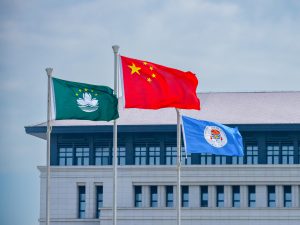
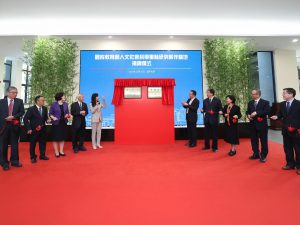
In 2019, the UM Faculty of Law’s Centre for Constitutional and Basic Law Studies became a partner of the Center for Constitutional and Administrative Law at Peking University, a ke
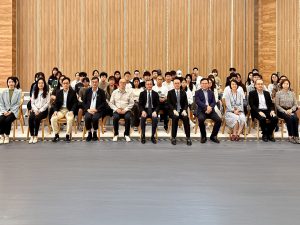
Opening ceremony of the 4th edition of the UM Constitution and Basic Law Student Ambassadors Training Programme
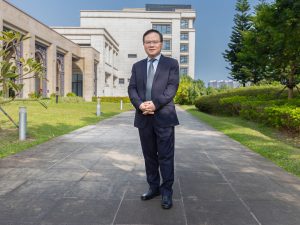
Prof Jiang Chaoyang
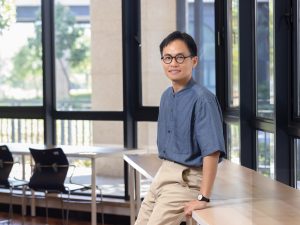
Prof Lai Kuan Ju
